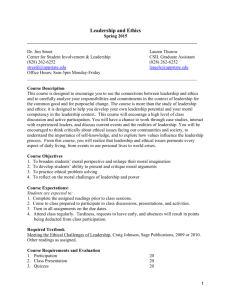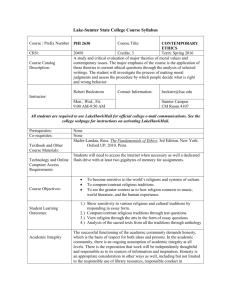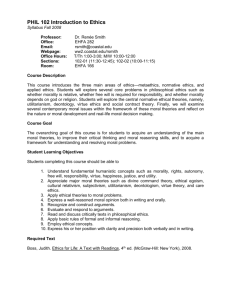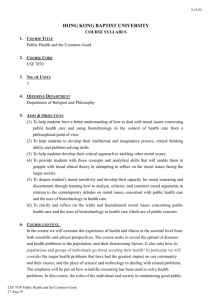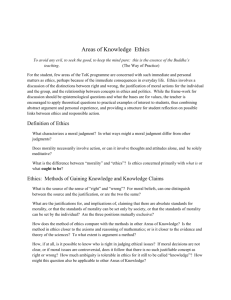W9642
advertisement
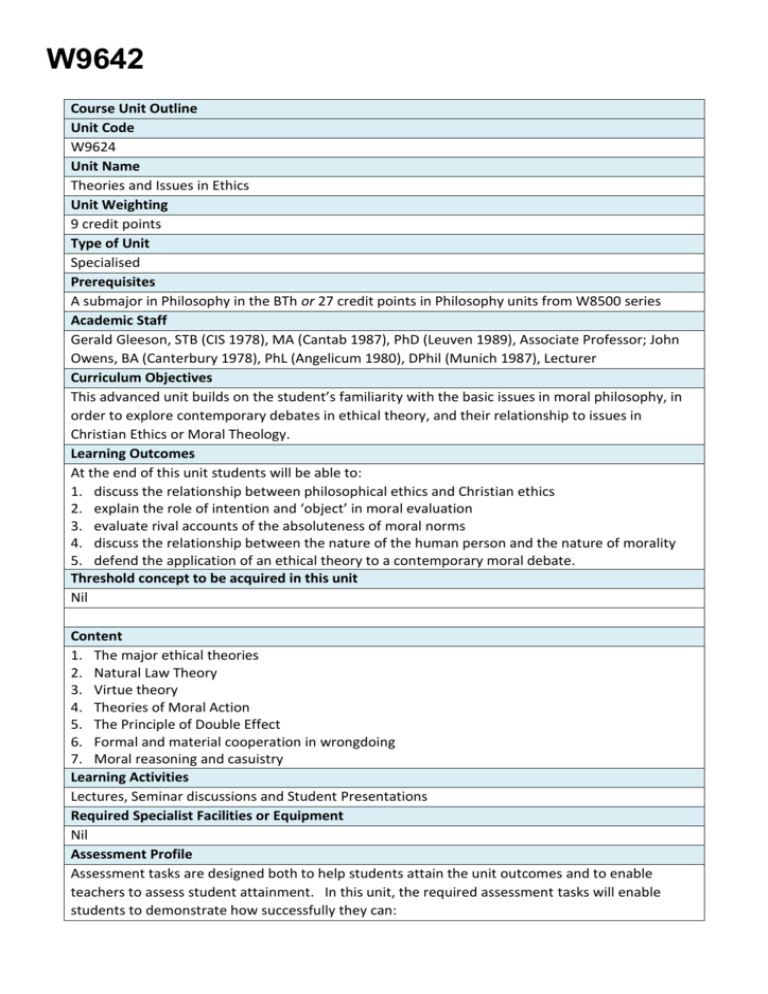
W9642 Course Unit Outline Unit Code W9624 Unit Name Theories and Issues in Ethics Unit Weighting 9 credit points Type of Unit Specialised Prerequisites A submajor in Philosophy in the BTh or 27 credit points in Philosophy units from W8500 series Academic Staff Gerald Gleeson, STB (CIS 1978), MA (Cantab 1987), PhD (Leuven 1989), Associate Professor; John Owens, BA (Canterbury 1978), PhL (Angelicum 1980), DPhil (Munich 1987), Lecturer Curriculum Objectives This advanced unit builds on the student’s familiarity with the basic issues in moral philosophy, in order to explore contemporary debates in ethical theory, and their relationship to issues in Christian Ethics or Moral Theology. Learning Outcomes At the end of this unit students will be able to: 1. discuss the relationship between philosophical ethics and Christian ethics 2. explain the role of intention and ‘object’ in moral evaluation 3. evaluate rival accounts of the absoluteness of moral norms 4. discuss the relationship between the nature of the human person and the nature of morality 5. defend the application of an ethical theory to a contemporary moral debate. Threshold concept to be acquired in this unit Nil Content 1. The major ethical theories 2. Natural Law Theory 3. Virtue theory 4. Theories of Moral Action 5. The Principle of Double Effect 6. Formal and material cooperation in wrongdoing 7. Moral reasoning and casuistry Learning Activities Lectures, Seminar discussions and Student Presentations Required Specialist Facilities or Equipment Nil Assessment Profile Assessment tasks are designed both to help students attain the unit outcomes and to enable teachers to assess student attainment. In this unit, the required assessment tasks will enable students to demonstrate how successfully they can: 1. Expound and critically evaluate at least two contemporary ethical theories (e.g. in an essay or a seminar presentation). Early diagnostic task. [Outcomes 3 and 4] 2. Critically evaluate rival accounts of the ethical components of human action (e.g.in a major essay). [Outcomes 1, 2 and 3] 3. Apply reflex ethical principles (e.g. double effect) to a contemporary ethical situation (e.g. in an essay or oral presentation). [Outcomes 2, 3 and 5]. Representative References 1. Baron, Marcia W., Phillip & Michael Slote. Three Methods of Ethics. Oxford: Blackwell, 1997. 2. Chappell, T. D. Ethics and Experience. Durham: Acumen, 2009. 3. Foot, Phillipa. Natural Goodness. Oxford: Clarendon, 2001. 4. George, Robert (ed). Natural Law, Liberalism and Morality. Oxford: Oxford University Press, 2002. 5. Hursthouse, Rosalind. On Virtue Ethics. Oxford: OUP, 1999. 6. Jensen, Steven J. Good & Evil Actions. Washington: CUA Press, 2010. 7. LaFollette, Hugh (ed). The Blackwell Guide to Ethical Theory. Oxford: Blackwell, 2000. 8. MacIntyre, Alastair. Three Rival Versions of Moral Inquiry. London: Duckworth, 1990. 9. McDonald, Scott & Eleonore Stump. Aquinas’s Moral Theory. Ithaca: Cornell University Press, 1999. 10. Pope, Stephen J. (ed). The Ethics of Aquinas. Washington DC: Georgetown University Press, 2002. 11. Porter, Jean. Nature as Reason: A Thomistic Theory of the Natural Law. Grand Rapids, MI: Wm. Eerdmans, 2005. 12. Rhonheimer, Martin. The Perspective of the Acting Person (William F. Murphy etc). Washington, DC: Catholic University of America Press, 2008. 13. Spaemann, Robert. Happiness and Benevolence. Trans. Jeremiah Alberg, SJ. Notre Dame & London: University of Notre Dame Press, 2000. 14. Wiggins, David. Ethics. Twelve Lectures on the Philosophy of Morality. London: Penguin, 2006.







